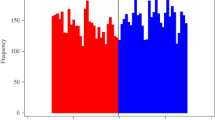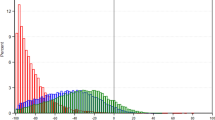Abstract
The Food for Education (FFE) program was introduced to Bangladesh in 1993. This paper evaluates the effect of this program on school participation and duration of schooling using household survey data collected in 2000. Using propensity score matching combined with difference-in-differences methodologies, we find that the program is successful in that eligible children on average have 15% to 26% higher school participation rates, relative to their counterfactuals who would have been eligible for the program had they lived in the program-eligible areas. Conditional on school participation, participants also stay at school 0.7 to 1.05 years longer than their counterfactuals.
Similar content being viewed by others
References
Abadie A, Imbens G (2004) On the failure of the bootstrap for matching estimators. Harvard University, Cambridge
Abadie A, Imbens G (2006) Large sample properties of matching estimators for average treatment effects. Econometrica 74(1):235–267
Ahmed AU (2000) Targeted distribution. In: Ahmed R, Haggblede S, Choudhury T-E-E (eds) Out of the shadow of famine: evolving food markets and food policy in Bangladesh, Chepter 11. The John Hopkins University Press for the International Food Policy Research Institute, Baltimore
Ahmed AU, del Ninno C (2002) The food for education program in Bangladesh: an evaluation of its impact on educational attainment and food security. Food Consumption and Nutrition Division Discussion Paper No. 138. International Food Policy Research Institute, Washington D.C., September
Alam M, Hoque MS, Anwaruzzaman C, Chowdhury OH, Sarkar AI (1999) Enhancing accessibility to and retention in primary education for the rural poor in Bangladesh: an evaluation of the food for education program. Bangladesh Institute of Development Studies, Dhaka, 7 June
Angrist JD, Bettinger E, Bloom E, King E, Kremer M (2002) Vouchers for private schooling in Colombia: evidence from a randomized natural experiment. Am Econ Rev 92(5):1535–1559
Armecin G, Behrman JR, Duazo P, Ghuman S, Gultiano S, King EM, Lee N, Office of Population Studies, University of San Carlos ECD Team (2006) Early childhood development through integrated programs: evidence from the Philippines. Cebu City, New York, Philadelphia and Washington: Universityies of Pennsylvania, and San Carlos, Population Council and World Bank
Behrman JR, Cheng, Y, Todd P (2004) Evaluating preschool programs when length of exposure to the program varies: a non-parametric approach. Rev Econ Stat 86(1):108–132
Behrman JR, Sengupta P, Todd PE (2005) Progressing through PROGRESA: an impact assessment of Mexicos school subsidy Expeiment. Econ Dev Cult Change 54(1):237–275
Behrman JR, Parker SW, Todd PE (2007) Medium-term impacts of the oportunidades conditional cash transfer program on rural youth in Mexico. In: Klase S, Nowak-Lehmann F (eds) Poverty, inequality, and policy in Latin America. MIT, Cambridge
Bettinger E, Slonim R (2006) Using experimental economics to measure the effects of a natural educational experiment on altruism. J Public Econ 90(8–9):1625–1648
Blundell R, Costa Dias M (2000) Evaluation methods for non-experimental data. Fisc Stud 21(4):427–468
Bourguignon F, Ferreira FHG, Leite PG (2003) Conditional cash transfers, schooling and child labor: micro-simulating Brazils bolsa eschola program. World Bank Econ Rev 17(2):229–254
Coady DP, Parker SW (2004) Coast-effectiveness analysis of demand- and supply-side education interventions: the case of progresa in Mexico. Rev Dev Econ 8(3):440–451
Dehejia RH, Wahba S (2002) Propensity score-matching methods for none-experimental causal studies. Rev Econ Stat 84(1):151–161
Heckman JJ, Ichimura H, Todd PE (1997) Matching as an econometric evaluation estimator: evidence from evaluating a job training program. Rev Econ Stud 64:605–654
Heckman JJ, Ichimura H, Smith J, Todd PE (1996) Sources of selection bias in evaluation social programs: an interpretation of conventional measures and evidence on the effectiveness of matching as a program evaluation method. Proc Natl Acad Sci U S A 93:13416–13420
Katz L, King J, Liebman J (2001) Moving to opportunity in Boston: early results of a randomized mobility experiment. Q J Econ 116(2):607–653
Maluccio JA, Flores R (2005) Impact evaluation of a conditional cash transfer program: the Nicaraguan red de proteccion social. Research Report 141. International Food Policy Research Institute, Washington D.C.
Ravallion M, Wodon Q (2001) Does child labour displace schooling? Evidence on behavioural responses to an enrollment subsidy. Econ J 110:C158–C175, March
Rosenbaum P, Rubin DB (1985) Constructing a control group using multivariate matched sampling methods that incorporate the propensity score. Am Stat 39:33–38
Rosenzweig MR, Wolpin KL (1986) Evaluating the effects of optimally distributed public programs. Am Econ Rev 76(3):470–487
Rouse C (1998) Private school vouchers and student achievement: an evaluation of the milwaukee parental choice program. Q J Econ 113(2):553–602
Rubin DB (1978) Bayesian inference for causal effects: the role of randomization. Ann Stat 7:34–58
Schultz P (2004) School subsidies for the poor: evaluating the Mexican progresa poverty program. J Dev Econ 74(1):199–250
Skoufias E, McClafferty B (2001) Is PROGRESA working? In: Summary of the results of an evaluation by IFPRI. Food consumption and nutrition division discussion paper no. 118. International Food Policy Research Institute, Washington D.C., July
Author information
Authors and Affiliations
Corresponding author
Additional information
Responsible editor: Christian Dustmann
Rights and permissions
About this article
Cite this article
Meng, X., Ryan, J. Does a food for education program affect school outcomes? The Bangladesh case. J Popul Econ 23, 415–447 (2010). https://doi.org/10.1007/s00148-009-0240-0
Received:
Accepted:
Published:
Issue Date:
DOI: https://doi.org/10.1007/s00148-009-0240-0




